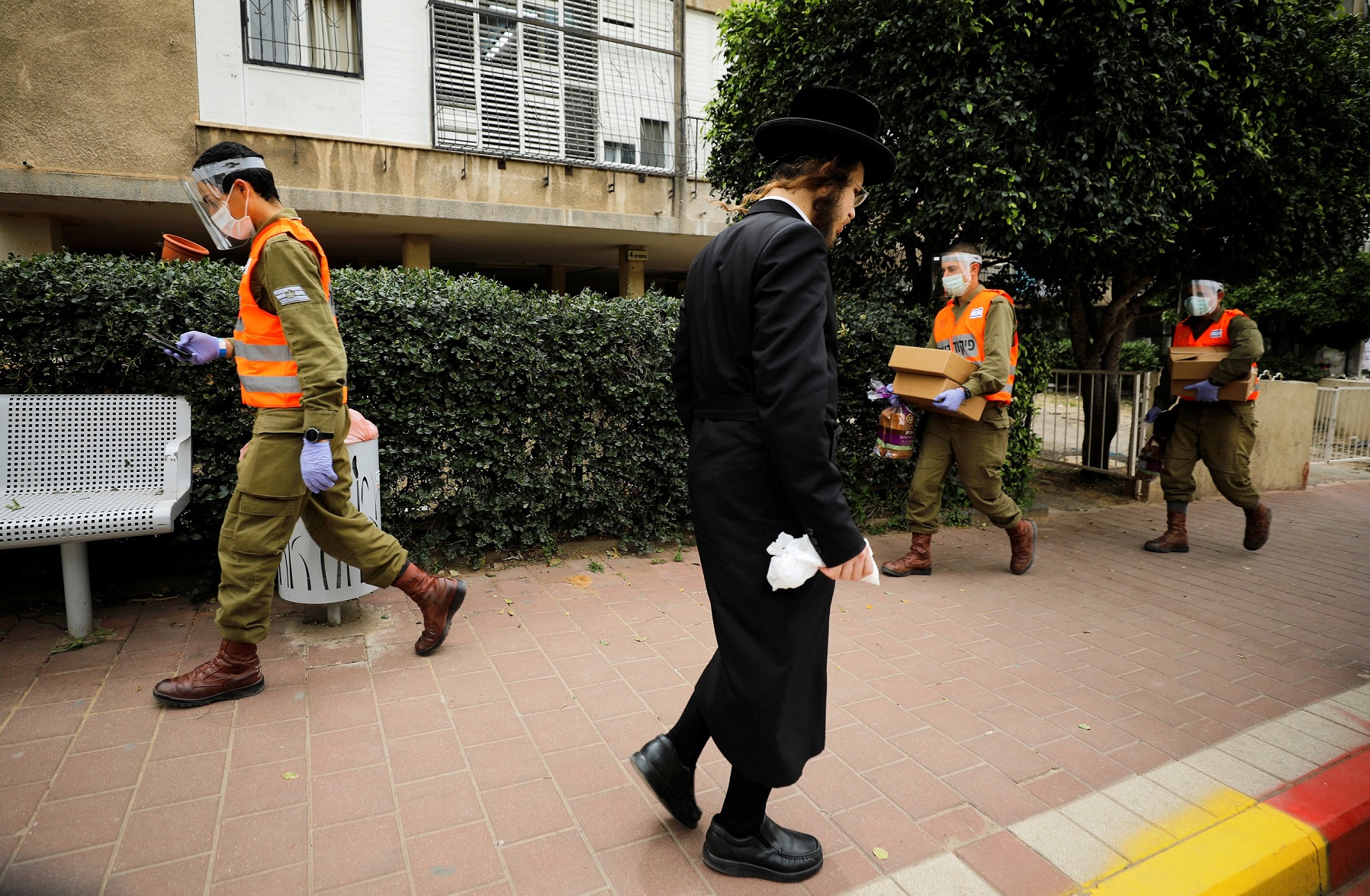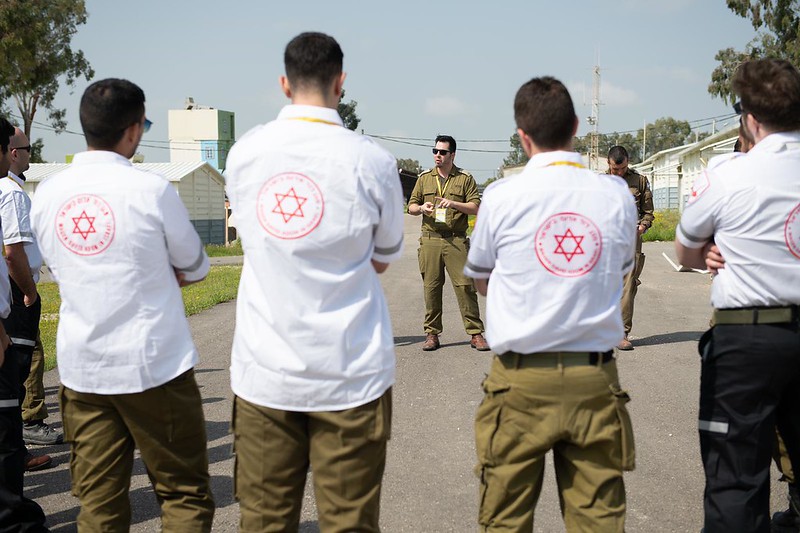Ariel Heimann

The IDF has recently assigned soldiers from combat units to tasks of protecting the residents of Jerusalem, Tel Aviv, and other cities, as reinforcement for the Israel Police. This situation is problematic in many senses, as assigning soldiers to policing tasks is a measure that is reserved for real emergency situations. Despite the current tense security reality, it seems that it is not a situation that justifies this step. Normalizing the use of armed soldiers to address security threats within the country’s territory could evolve into a slippery slope, and IDF soldiers could find themselves in conflict with those they were sent to protect, while they lack police authority and do not have appropriate training. Furthermore, the activity of armed soldiers in major cities could be interpreted as militarization of the public sphere, and the military in this case could become a tool in the hands of the civilian authorities and as a substitute for the police. This reality could erode the concept of national emergency and raise questions about the purpose of mandatory service in the IDF.
Against the backdrop of the tense security situation in recent weeks (which is expected to continue in the coming weeks as well), and in accordance with a decision by the Minister of Defense, the IDF is now assigning soldiers from combat units, while armed and wearing army uniforms, to tasks of protecting residents, as reinforcement for the police forces in Jerusalem, Tel Aviv, and other areas within Israel. This is not the first time that IDF forces have reinforced police forces at points of friction in times of emergency, but it is important and even necessary to examine the dilemmas and implications inherent in such a measure.
Unlike police, IDF soldiers do not have the authority to take action against citizens – to establish a reasonable suspicion or to warn them – when checking them. In addition, many times, the soldiers sent to semi-policing tasks are in training and sometimes even in basic military training. In the case of a complex incident in which it is necessary to distinguish between participants and non-participants in activity that involves a security threat, the lack of appropriate training could take a toll that outweighs the benefit.
The diversion of regular units from training or the cessation of training exercises could have implications for the soldiers' competence for their main operational mission, that is, combat against enemies in the various arenas.
The deployment of IDF soldiers within the sovereign territory of the State of Israel for a task that is not a national emergency mission is highly problematic. A reality in which armed soldiers operate in the streets of major cities is familiar in countries in which the military is the ruler. Policing tasks and security tasks by armed forces in a territory managed by the military by virtue of international law, facing a population within which hostile forces operate (the West Bank), is not equivalent to policing tasks within the sovereign territory of the state and among its citizens. The concept of national emergency could erode, and in tandem, questions regarding the purpose of mandatory service in the IDF might arise.
The reality of armed soldiers in city streets conveys a sense of concern and inability of Israel's internal security forces to provide security, and this can create cracks in the image of strength that Israel is trying to project outwards. At the same time, alongside the reassuring message toward citizens ("someone is protecting you"), their sense of anxiety could intensify ("if I need to be protected then it's a worrying situation").
Policing tasks are another dimension of the military’s multiple functions, but in cases of the deployment of soldiers within cities, they are not tasks of education, settlement, or aid in coping with natural disasters, but the use of force. In most cases in which the IDF has helped the Israeli police in its tasks, for example during the COVID-19 crisis, the soldiers that joined the policing forces or operated in policing tasks were not armed with their personal weapons, and the directive then was to minimize policing tasks by soldiers. Normalizing the use of armed soldiers for coping with security threats within the country's territory, in the presence of and among citizens, could develop into the use of armed soldiers in cases regarding other threats, which would be defined by the political leadership as serious threats. Therefore, this is necessarily a slippery slope – which is why democracies around the free world are careful not to use soldiers around civilians within the country's actual territory, but just regarding external threats.

To clarify the dilemma, consider two events that are not identical that required military intervention. The first is the COVID-19 crisis. Even though this was not a security crisis, the IDF needed to help the civilian systems and received extensive responsibility for handling the crisis. Most of the tasks involved providing assistance (by the Alon Command Center in the Home Front Command and bringing soldiers into cities for the purpose of distributing food), but the stationing of soldiers alongside police for the purposes of enforcing lockdowns and restrictions on movement was also considered. These suggestions were rejected by the IDF, and rightfully so. However, in individual cases, soldiers were also assigned policing tasks vis-à-vis civilians. The second event was the clashes between Arabs and Jews in the cities with mixed populations during Operation Guardian of the Walls. For various reasons, the Israel Police did not fulfill its tasks and asked the IDF for help. Calls to bring IDF forces into cities came not only from the police, but also from political figures and from the public. Then-Minister of Defense Lt. Gen. (ret.) Benny Gantz did not allow this, rightly claiming that it is not the place of the military to confront citizens of the State of Israel.
The IDF and the security establishment are currently preparing for a future event, in which the IDF will have a role in coping with riots within Israel. Such a situation could occur during a military operation, when military forces need freedom of movement on the roads between the country's north and south, including in population centers. To this end, it is necessary to establish the National Guard (in a model previously proposed, which is different from the one currently promoted by Minister of National Security Itamar Ben-Gvir), which is supposed to comprise reserve soldiers, who will need to ensure that the roads are open for the passage of forces. In this case, it is possible that the soldiers will find themselves facing the country's citizens. While this will be a war situation, which has special rules, they need to be well-regulated. For example, it is possible that there will be a need to train the soldiers for relevant tasks, to provide them with policing powers, or alternatively, to include police officers in each group of soldiers.
The IDF, as the people's army, has an unwritten contract with Israeli society whereby in times of emergency it takes part in helping, and if required to do so – takes on national missions. However, even when IDF soldiers are assigned protection tasks among the civilian population in Israel's cities, their role is to protect the country's citizens. However, IDF soldiers might find themselves in conflict with those they were sent to protect, while they lack appropriate authority. Despite the sentiment and the confidence that the public has in the IDF in general, the thought that soldiers are trained for policing tasks and can perform them properly does not necessarily reflect the reality. Indeed, events in the West Bank indicate that this is not necessarily the case: many times, in a place where soldiers do not succeed in enforcing order, Border Police officers, who are well trained, do so with great success.
The State of Israel must be very careful in using military force within the state's sovereign territory for a task that is not a national emergency mission. This is a fundamental and substantive principle in a democratic state, and certainly in a state where the service model is based on the people's army model and mandatory enlistment. A reality in which armed soldiers operate in the streets of the main cities could be interpreted as militarization of the public sphere, and the military in this case could become a tool in the hands of civilian authorities that are not the Ministry of Defense or the IDF. This is a reality that is familiar in totalitarian states, which could erode the concept of national emergency. Furthermore, it is important to consider an increase in tension and anxiety as a result of armed soldiers stationed in city streets.
Thus, even if there are "no choice" situations in which the police request help from the IDF, a decision to position the military in Israel's cities should not be taken hastily or perfunctorily. The assignment of soldiers to policing tasks is a measure reserved for real emergency situations. Despite the tense security reality, it seems that the current situation does not justify such an extreme step.
No comments:
Post a Comment